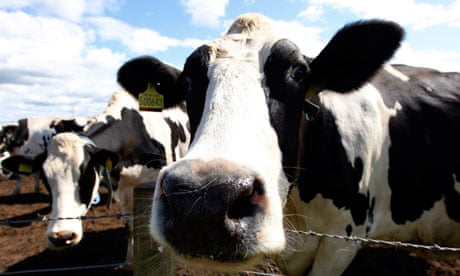Is it possible to be a profitable restaurant chain and still live up to your goal of serving "food with integrity" to an ever expanding customer base? Those who decry the dismal state of modern farming practices will say it's not. Steve Ells, CEO and founder of Chipotle Mexican Grill is trying to prove them wrong.
I met Ells at his office in New York and there was much to discuss. The little burrito shop he opened back in 1993 that was intended to be the cash cow for the full-scale restaurant of his dreams, now has over 1,400 locations in the United States, has broken into Canada, France and Germany and has just opened its sixth UK location in Wimbledon. In the midst of all this expansion, the chain, which specialises in Mexican food made from fresh and natural ingredients, has just won a good pig and good chicken award from Compassion in World Farming. And now, 20 years into the Chipotle experiment, Ells seems less concerned with the cash aspect of things than with whether the cows that provide the beef and cheese for his burritos have been injected with antibiotics or hormones.
If you have been to a Chipotle, especially at lunchtime when the lines are long, you'll have had time to read the signs adjacent to the menu board highlighting the chain's "food with integrity" mission.
The cows are not treated with the recombinant bovine growth hormone (rBGH), and the pigs and chicken are antibiotic free and fed an all vegetarian diet. A more typical fast food restaurant (Ells is okay with the designation by the way – "it's food and it's fast"), will generally try to distract customers from questions about where and how the food they are buying was sourced and produced, Chipotle does the opposite and exposes the chain to about equal doses of praise and cynicism for its troubles.
Trying to source sustainably produced and cruelty free meat and chicken in America, where large agribusinesses have a monopoly on farming practices is not an easy feat. Ells will be the first to admit that while Chipotle's efforts are genuine in this regard, there is much room for improvement. He gave me a quick lesson while I was with him on the disturbing business of how a typical chicken is raised, or to use industry parlance "grown", in America. Ninety-nine per cent of the chicken we end up eating comes from birds whose short lives (they go from cradle to grave in about six weeks) are defined by how much they suffer.
The genetics of the modern broiler are such that they could not roam free outside even if the option was available to them. These birds fatten so quickly that they do not have time to develop a skeletal structure. They usually live in filthy and overcrowded pens where they are literally wallowing in their own fecal matter. They are sometimes fed arsenic to fatten them up quicker and pumped with antibiotics to counteract the inevitable spread of disease that results from such living conditions.
Within this reality, what Chipotle has been able to do is source chickens that are not treated with antibiotics, have an all vegetarian feed and slightly more room to roam about. But to really change the chicken production industry, Ells tells me, the genetics of the modern broiler has to change. To this end, Chipotle has begun working with farmers on a long-term project to look at genetics and crosses of breeds to see what might work for both taste and efficiencies. The project is in the early stages and they have just completed the first round of tests.
The quest to find naturally raised pork has been similarly challenging. Ells insisted on showing me a video of an ad the company made about pig farming, which aired during the Grammy awards. The ad is an animated tale of a young farmer, who gets seduced by the efficiency of industrialised pork production only to find as he gets older that as a farmer and a man he has lost his way. By the end of the two minute video, the hero has returned to traditional farming methods. He has, as Willie Nelson sings on the sound track, gone "back to the start". It's a little corny, perhaps, but sweet and effective too and seems to be as much about Ells's journey as the fictional character it features.
In 1999, Ells read an article in The Art of Eating magazine about a farmer called Paul Willis who was raising pigs the natural way at the Niman Ranch in Iowa and decided he wanted some of this mouthwateringly delicious pork in his restaurants. The natural pork was more expensive, but customers did not object to paying a little more for a much tastier product. As Chipotle expanded, so did Niman Ranch's capacity to support farmers raising pigs the old fashioned way. "For a time," Willis told me, "every time they added a restaurant, we added another farmer." Ultimately Chipotle's demand outstripped what Niman can supply and they have had to seek additional pork suppliers to make up the shortfall.
And that brings us back to the question of whether an ambitious company can maintain its integrity when the supply of naturally raised food fails to meet demand. One option is to give in and just buy up what's out there, the other option is to push more farmers to change their methods, and indeed make it possible for them to change, by guaranteeing a market for ethically produced food.
Chipotle's record to date suggests that the latter option is more in line with their overall mission. If they don't lose sight of that, it could be very good news for sustainable farming.
This content is brought to you by Guardian Professional. Become a GSB member to get more stories like this direct to your inbox

Comments (…)
Sign in or create your Guardian account to join the discussion